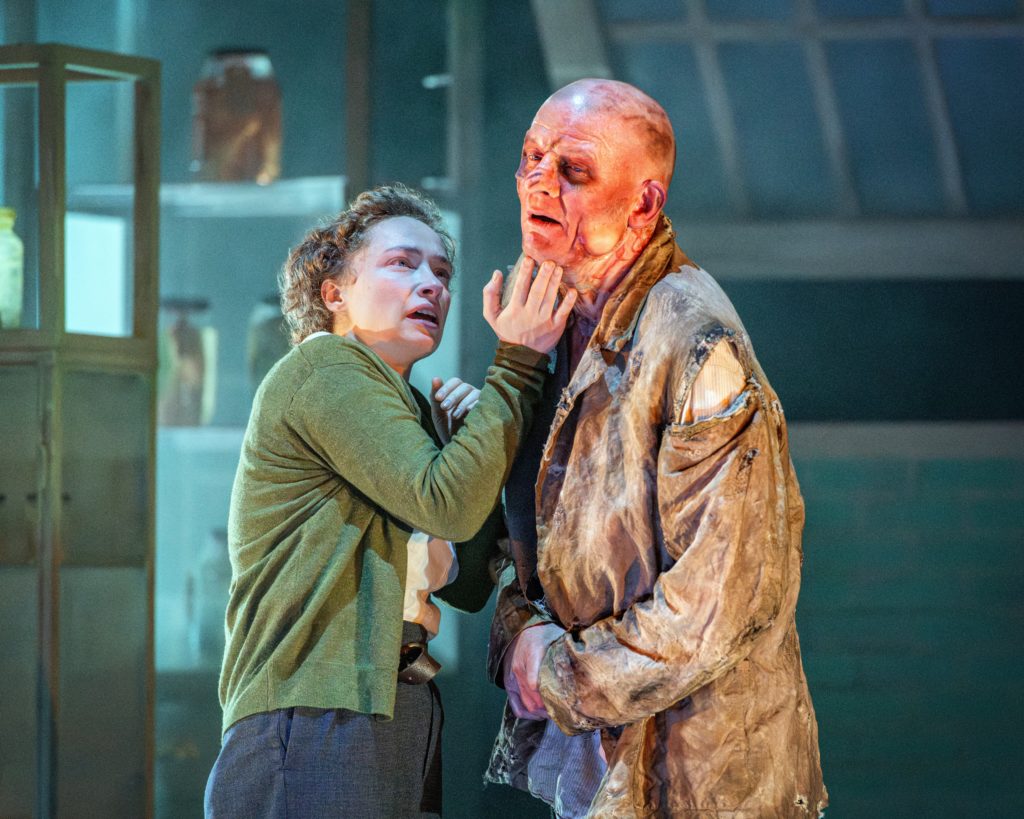
AFTER their liaison with York Theatre Royal for a tour of Juliet Forster’s production of Around The World In 80 Days earlier this year, Tilted Wig make a welcome return north with Frankenstein. In Halloween season, as chance would have it, in a tour running from September 14 to November 25.
Forget Halloween. This is not Frankenstein’s monster of six Hammer horror films or Mel Brooks’s Young Frankenstein. This is Frankenstein reimagined by Séan Aydon after Mary Shelley, as the cover to Tilted Wig’s elegantly designed programme denotes.
An earnest, deadly serious, deeply humanitarian Frankenstein with only one shard of humour and two significant changes: scientist Doctor Victor Frankenstein has become Doctor Victoria Frankenstein (Eleanor McLoughlin), and the gothic sci-fi novel’s 1818 setting has moved to wartime 1943 in Poland.
Neither the Nazis, nor the Second World War in name is mentioned, but the shadow of eugenics, and indirectly the creation of a master race, an Aryan nirvana, casts a dark shadow over Doctor Frankenstein’s experiments and the ruthless university philosophy of Basienka Blake’s Richter.
Aydon’s production opens in a dry ice fog in a wooden hut, the spartan emergency home of Blake’s first character, Captain. A frantic knock on the door: McLoughlin’s exhausted Victoria Frankenstein is seeking shelter and sustenance.
Here are two women “hiding from their past at what feels like the very end of the world”. One of them, Frankenstein, has a terrifying story to tell; the other has a gun in her hand, demanding that she tell it.
Whereupon Nicky Bunch’s set peels back to reveal Frankenstein’s laboratory, where a storm is brewing on the perfect night for sufficient electricity to spark her creation, made from body parts, into life.
In Bunch’s design, the profusion of laboratory jars lights up,like beacons, as if in response to Doctor Frankenstein’s excitement at this golden opportunity for scientific progress. She will share her exact plans with Francine (Annette Hannah in her impressive professional theatre debut), but not with husband Henry (Dale Mathurin), and nor with her sister Elizabeth. On her first visit in six months, with no letters home in that time, Victoria is too preoccupied to have dinner with her.
The Creature’s sudden surge into life as the storm crackles is an electrifying piece of theatre in every way, visually, aurally, musically: the peak of Eamonn O’Dwyer’s sound designs in a scree of discordant strings. Horrifying, remarkable, breathtaking, amid the rusted operating equipment.
Aydon has created a thriller as much as a horror story, one with a sense of moral responsibility that suits its wartime setting but resonates anew in our new age of artificial intelligence and robotics and our fears over the route this AI is taking.
Aydon’s exploration of “the very fabric of what makes us human and the ultimate cost of chasing ‘perfection’” puts both McLoughlin’s Frankenstein and Cameron Robertson’s Creature under the spotlight.
She is thrilled anew at the possibility of creating a partner for The Creature, at his demand, until she is challenged by Hannah’s Francine over her own status, as a dwarf. Where does that fit in with this pursuit of “perfection”?
A shattering moment, indeed, one that confronts all human experimentation and scientific exploration, just as in Michael Mann’s film Oppenheimer this summer.
Robertson’s Creature is never given a name by Doctor Frankenstein. He calls her “Mother” when they finally meet after his escape on that first night through a broken window. Another deeply impactful moment that makes Aydon’s production so powerful in its transition from Shelley’s series of letters to theatre of the imagination, a ghost story of the haunted Frankenstein.
The Creature, left to fend for himself, teaches himself how to talk, to learn Shakespeare too. That will make for an extraordinarily moving finale when The Creature reprises Hamlet’s final speech: What is a man, If his chief good and market of his time Be but to sleep and feed? A beast, no more.“
“The rest is silence,” he concludes, just as Hamlet did. Silence does indeed fall across the Theatre Royal auditorium, but then explosive applause follows, and the conversations begin.
A Frankenstein for today, a cautionary tale with a fearful message for tomorrow, Tilted Wig’s reinvention demands to be seen.
Tilted Wig in Frankenstein, York Theatre Royal, today at 2.30pm and 7.30pm. Box office: 01904 623568 or yorktheatreroyal.co.uk. Not suitable for under 12s.




